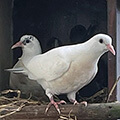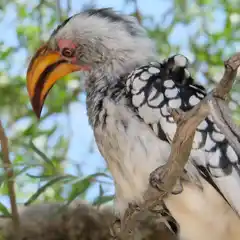







The coccidian Eimeria tenella is a parasite that replicates in the epithelial cells of the caeca in domestic chicken causing the disease chicken coccidiosis, characterised by a range of clinical symptoms including malabsorption, diarrhoea and haemorrhage. Heme is an essential molecule in most aerobic organisms, including coccidian, as it serves as a prosthetic group of hemoproteins involved in many fundamental physiological processes; the ferrochelatase enzyme is involved in the last step of the heme pathway. In this study, potential inhibitors of the ferrochelatase enzyme were evaluated with an in silico high-throughput screening (HTS). From this analysis, the best 40 compounds according to hydrogen bond formation and toxicity in silico prediction were selected for further validation. In vitro studies showed that only two compounds were able to inhibit E. tenella sporozoite invasion; however, seven compounds significantly inhibited parasite replication, which aligns with the momenta in which ferrochelatase transcript levels are higher.
Return to the Grants Awarded page.